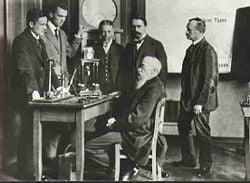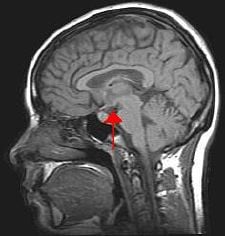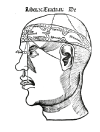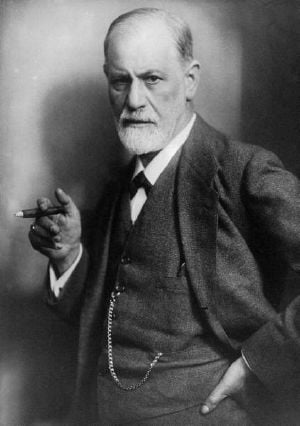Psychology
 From Nwe
From Nwe | Psychology |
| History |
| Psychologists |
| Divisions |
|---|
| Abnormal |
| Applied |
| Biological |
| Clinical |
| Cognitive |
| Comparative |
| Developmental |
| Differential |
| Industrial |
| Parapsychology |
| Personality |
| Positive |
| Religion |
| Social |
| Approaches |
| Behaviorism |
| Depth |
| Experimental |
| Gestalt |
| Humanistic |
| Information processing |
Psychology (from Greek, literally "study of the soul," from ψυχή, psyche, "breath, spirit, soul," and -λογία -logia, "study of" or "research") is both an academic and applied discipline involving the scientific study of mind and behavior. Psychologists attempt to understand the role of mental functions in individual and social behavior, while also exploring the physiological and neurobiological processes that underlie certain functions and behaviors. To do this, they study such phenomena as perception, cognition, emotion, personality, behavior, and interpersonal relationships. Some, especially depth psychologists, also consider the unconscious mind and the spiritual nature of human beings.
Psychology is generally classified within the social sciences, although, since it overlaps with the natural sciences it is also considered one of the behavioral sciences—a broad field that spans the social and natural sciences. It attempts to understand the role human behavior plays in social dynamics while incorporating physiological and neurological processes into its conceptions of mental functioning. Psychology includes many sub-fields of study concerned with such areas as human development, sports, health, industry, law, and spirituality. Psychology also refers to the application of such knowledge to various spheres of human activity, including issues related to daily life—such as family, education, and work—and the treatment of mental health problems.
While psychological knowledge is often applied to the assessment and treatment of mental health problems, it is also applied to understanding and solving problems in many different spheres of human activity. Many psychologists are involved in some kind of therapeutic role, practicing in clinical, counseling, or school settings. Others do scientific research on a wide range of topics related to mental processes and behavior, and typically work in university psychology departments or teach in other academic settings. Some are employed in industrial and organizational settings, or in other areas such as human development and aging, sports, health, and the media, as well as in criminal justice and other aspects of law.
For many, the ultimate goal of psychology is to benefit human society through understanding human nature. This is a challenging enterprise since psychologists are also human beings, the same as their objects of study—psychology is the study of human beings by human beings. The complexity of the human being makes this even more difficult, and has led to numerous debates and splits within the discipline.
History
The history of psychology as a scholarly study of the mind and behavior dates back to the ancient civilizations of Egypt, Greece, China, India, and Persia. Historians point to the writings of ancient Greek philosophers, such as Aristotle (especially in his De Anima treatise), as the first significant body of work in the West to be rich in psychological thought.[1]
Beginning of the Scientific era

In 1879, Wilhelm Wundt founded a laboratory for the scientific study of psychology at Leipzig University in Germany, earning himself recognition as the founder of experimental psychology.[2] The American philosopher William James published his seminal book, Principles of Psychology, in 1890, laying the foundations for many of the questions that psychologists would focus on for years to come. Other important early contributors to the field include Hermann Ebbinghaus (1850–1909), a pioneer in the experimental study of memory at the University of Berlin; and the Russian physiologist Ivan Pavlov (1849-1936), who investigated the learning process now referred to as classical conditioning.
Meanwhile, during the 1890s, the Austrian physician Sigmund Freud developed a method of psychotherapy known as psychoanalysis. Freud's understanding of the mind was largely based on interpretive methods, introspection and clinical observations, and was focused in particular on resolving unconscious conflict, mental distress, and psychopathology. Freud's theories became very well-known, largely because they tackled subjects such as sexuality, repression, and the unconscious mind as general aspects of psychological development. These were largely considered taboo subjects at the time, and Freud provided a catalyst for them to be openly discussed in polite society. His work led to much controversy, even his own former colleagues rejecting some of his ideas. The Swiss founder of analytical psychology, Carl Jung, whom Freud at one time had hoped would carry "Freudianism" into the future, separated from him when Jung's commitment to religion and mysticism, as evidenced in the significant role of the collective unconscious, conflicted with Freud's atheism and commitment to science and the use of mechanical systems to explain human nature. This separation of two great figures impacted not only their own research and theoretical development, but also affected the development of psychology, leading to divergent schools regarding the conception of the human mind that remain separate to this day.
Rise and fall of Behaviorism
Partly in reaction to the subjective and introspective nature of Freudian psychodynamics, and its focus on the recollection of childhood experiences, during the early decades of the twentieth century, Behaviorism gained popularity as a guiding psychological theory. Founded by John B. Watson and embraced and extended by Edward Thorndike, Clark L. Hull, Edward C. Tolman, and later B. F. Skinner, behaviorism was grounded in studies of animal behavior. Behaviorists shared the view that the subject matter of psychology should be operationalized with standardized procedures which led psychology to focus on behavior, not the mind or consciousness.[3] They doubted the validity of introspection for studying internal mental states such as feelings, sensations, beliefs, desires, and other unobservables. In his paper, "Psychology as the Behaviorist Views It" published in 1913, Watson argued that psychology "is a purely objective experimental branch of natural science," that "introspection forms no essential part of its methods," and that "the behaviorist recognizes no dividing line between man and brute."[4] In his work on the study of learning, Skinner famously argued that psychology was not ready for the creation of theories, but rather that progress toward an understanding of learning would be better achieved by the collection of "data showing orderly changes characteristic of the learning process." [5]
Behaviorism reigned as the dominant model in psychology throughout the first half of the twentieth century, largely due to the creation of conditioning theories as scientific models of human behavior, and their successful application in the workplace and in fields such as advertising and military science. However, it became increasingly clear that, although it had made some important discoveries, behaviorism was deficient as a guiding theory of human behavior. Another revolution occurred in psychology in the 1950s, this time the "cognitive revolution."[6]
Noam Chomsky helped spark this revolution in psychology through his review of B. F. Skinner's Verbal Behavior, in which he challenged the behaviorist approach to the study of behavior and language.[6] He showed that the rules that govern the grammatical production of sentences are not the product of overt behavior but mechanisms of cognition—processes of the mind. Others, such as Jerome Bruner, began to take seriously the notion of cognitive strategies.[7] Similarly, work by Albert Bandura showed that children could learn by social observation, without any change in overt behavior, and so this must be accounted for by internal representations.[8]
Cognitivism
The rise of computer technology promoted the metaphor of mental function as information processing. This, combined with a scientific approach to studying the mind, as well as a belief in internal mental states, led to the rise of cognitive psychology.
Links between brain and nervous system function were also becoming common, partly due to the experimental work of those such as Donald O. Hebb and neuroscientist Charles Sherrington, and partly due to studies of people with brain injury. With the increasing involvement of other disciplines (such as philosophy, computer science and neuroscience) in the quest to understand the mind, the umbrella discipline of cognitive science has been created as a means of focusing such efforts in a constructive way.
Humanistic movement
Humanistic psychology also developed in the 1950s in reaction to both behaviorism and psychoanalysis. By using phenomenological, intersubjective, and first-person categories, the humanistic approach seeks to get a glimpse of the whole person and not just the fragmented parts of the personality or cognitive functioning.[9] Humanism focuses on uniquely human issues and fundamental issues of life, such as self-identity, death, aloneness, freedom, and meaning. Some of the founding theorists behind this school of thought were Abraham Maslow who formulated a hierarchy of human needs, Carl Rogers who created and developed Client-centered therapy, and Fritz Perls who helped create and develop Gestalt therapy. It has become so influential as to be called the "third force" within psychology (preceded by behaviorism and psychoanalysis).[10]
As the new millennium dawned with the twenty-first century, Positive psychology arose, originally a development of humanistic psychologists' research on happiness. Positive psychologists seek "to find and nurture genius and talent," and "to make normal life more fulfilling,"[11] not simply to treat mental illness. It does not seek to deny the importance of studying how things go wrong, but rather to emphasize the importance of using the scientific method to determine how things go right: "We believe that a psychology of positive human functioning will arise, which achieves a scientific understanding and effective interventions to build thriving individuals, families, and communities."[12] Research topics include states of pleasure or flow, values, strengths, virtues, and talents, as well the ways in which they can be promoted by social systems and social institutions.[13]
Subfields
Psychology encompasses a vast domain, and includes many different approaches to the study of mental processes and behavior. Below are the major areas of inquiry that comprise psychology, divided into fields of research psychology and fields of applied psychology.
Fields of research
Research psychology encompasses the study of behavior for use in academic settings, and contains numerous areas, many of which follow the experimental approach. It contains the areas of abnormal psychology, biological psychology, cognitive psychology, comparative psychology, developmental psychology, personality psychology, social psychology and others. Research psychology is contrasted with applied psychology.
Abnormal psychology
Abnormal psychology is the study of abnormal behavior in order to describe, predict, explain, and change abnormal patterns of functioning. It studies the nature of psychopathology and its causes, and this knowledge is applied in clinical psychology to treat patients with psychological disorders.
Of course, the definition of what constitutes "abnormal" has varied across time and across cultures. Individuals also vary in what they regard as "normal" or "abnormal" behavior, or merely idiosyncratic. In general, abnormal psychology can be described as an area of psychology that studies people who are consistently unable to adapt and function effectively in a variety of conditions. The four main contributing factors to how well an individual is able to adapt include their genetic makeup, physical condition, learning and reasoning, and socialization.
Biological psychology

Biological psychology, also known as behavioral neuroscience, is the scientific study of the biological substrates of behavior and mental states. There are different specialties within behavioral neuroscience. For example, physiological psychologists use animal models, typically rats, to study the neural, genetic, and cellular mechanisms that underlie specific behaviors such as learning and memory and fear responses.[14] Cognitive neuroscientists investigate the neural correlates of psychological processes in humans using neural imaging tools, and neuropsychologists conduct psychological assessments to determine, for instance, specific aspects and extent of cognitive deficit caused by brain damage or disease.
Cognitive psychology
Cognitive psychology studies cognition, the mental processes underlying behavior. Perception, attention, reasoning, thinking, problem solving, memory, learning, language, and emotion are areas of research. Classical cognitive psychology is associated with a school of thought known as cognitivism, whose adherents argue for an information processing model of mental function, informed by functionalism and experimental psychology.
On a broader level, cognitive science is an interdisciplinary enterprise of cognitive psychologists, cognitive neuroscientists, researchers in artificial intelligence and human–computer interaction, linguists, logicians, and other social scientists.
Comparative psychology
Comparative psychology refers to the study of the behavior and mental life of animals other than human beings. It is related to disciplines outside of psychology that study animal behavior, such as ethology. Although the field of psychology is primarily concerned with humans, the behavior and mental processes of animals is also an important part of psychological research, either as a subject in its own right (such as animal cognition and ethology), or with strong emphasis about evolutionary links, and somewhat more controversially, as a way of gaining an insight into human psychology by means of comparison or via animal models of emotional and behavior systems as seen in neuroscience of psychology (such as affective neuroscience and social neuroscience).
Developmental psychology
Mainly focusing on the development of the human mind through the life span, developmental psychology seeks to understand how people come to perceive, understand, and act within the world and how these processes change as they age. This may focus on intellectual, cognitive, neural, social, or moral development. In addition to studying children, developmental psychologists also study aging and processes throughout the life span, especially at other times of rapid change (such as adolescence and old age).
Developmental psychologists draw on the full range of theorists in scientific psychology to inform their research. Swiss researcher and theoretician Jean Piaget notably pioneered the study of cognitive development, and other theorists, such as Russian Lev Vygotsky, have regarded social cognition, or knowledge about people and social processes, as fundamental to human development. Urie Bronfenbrenner's theory of development in context is also influential in this field, as are theories in educational psychology as well as many other areas.
Researchers who study children use a number of unique research methods to make observations in natural settings or to engage them in experimental tasks. Such tasks often resemble specially designed games and activities that are both enjoyable for the child and scientifically useful, and researchers have even devised clever methods to study the mental processes of small infants.
Parapsychology

Parapsychology is area of psychology that studies certain paranormal phenomena, referred to as "Psi" phenomena.[15] Coined in German by psychologist Max Dessoir in 1889, the term "parapsychology" was adopted into English by researcher J. B. Rhine, and has largely superseded the older expression, "psychical research." Rhine's work is often thought of as the beginning of parapsychology as a science, as he developed a methodology of using card-guessing and dice-rolling experiments in the laboratory in an attempt to find a statistical validation of extra-sensory perception or ESP.[16] This type of experimental approach has characterized much of contemporary parapsychology.
The scientific reality of parapsychological phenomena and the validity of scientific parapsychological research is a matter of frequent dispute and criticism. The field is regarded by some critics as a pseudoscience. Parapsychologists, in turn, say that parapsychological research is scientifically rigorous. Despite the controversy, a number of organizations and academic programs have been created to conduct research into the existence, nature, and frequency of occurrence of such phenomena.
Personality psychology
Personality psychology studies enduring psychological patterns of behavior, thought and emotion, commonly referred to as an individual's personality. Theories of personality vary between different psychological schools. They carry different assumptions about such issues as the role of the unconscious and the importance of childhood experience. Sigmund Freud's structural theory divided personality into the ego, superego, and id. Freud's theory of personality has been criticized by many, including many mainstream psychologists.
Trait theories attempts to break personality down into a number of traits, by use of factor analysis. The number of traits have varied between theories. One of the first, and smallest, models was that of Hans Eysenck, which had three dimensions: extroversion—introversion, neuroticism—emotional stability, and psychoticism. Raymond Cattell proposed a theory of 16 personality factors. The theory that has most empirical evidence behind it today may be the "Big Five" theory, proposed by Lewis Goldberg, and others.
Quantitative psychology
Quantitative psychology involves the application of mathematical and statistical modeling in psychological research, and the development of statistical methods for analyzing and explaining behavioral data. It includes the two longer standing subfields of psychometrics and mathematical psychology.
Psychometrics is concerned with the theory and technique of psychological measurement, which includes the measurement of knowledge, abilities, attitudes, and personality traits. Psychometrics, on the other hand, is mainly concerned with individual differences and population structure, mathematical psychology is concerned with modeling of mental and motor processes of the average individual.
Psychometrics is more associated with educational, personality, and clinical psychology. Mathematical psychology is more closely related to psychonomics/experimental and cognitive, and physiological psychology and (cognitive) neuroscience.
Religion
Psychology of religion is the psychological study of religious experiences, beliefs, and activities. Psychologists in this field attempt to accurately describe the details, origins, and uses of religious beliefs and behaviors. William James, the American psychologist and philosopher, is regarded as the founder of the field. His influence in the field endures, with his 1902 publication, The Varieties of Religious Experience, considered to be the classic work in the field.
Social psychology

Social psychology is the study of the nature and causes of human social behavior, with an emphasis on how people think towards each other and how they relate to each other. It studies how individuals are influenced by their group membership and interactions, and other factors that affect social life, such as social status, role, and social class.
Social psychology investigates how we make sense of social situations. For example, this could involve the influence of others on an individual's behavior (such as conformity or persuasion), the perception and understanding of social cues, or the formation of attitudes or stereotypes about other people. Social cognition is a common approach and involves a mostly cognitive and scientific approach to understanding social behavior.
Social cognition fuses elements of social and cognitive psychology in order to understand how people process, remember, or distort social information. The study of group dynamics reveals information about the nature and potential optimization of leadership, communication, and other phenomena that emerge at least at the microsocial level. Many social psychologists have become increasingly interested in implicit measures, mediational models, and the interaction of both person and social variables in accounting for behavior.
Fields of application
Applied psychology encompasses both psychological research that is designed to help individuals overcome practical problems and the application of this research in applied settings. Much of applied psychology research is utilized in other fields, such as business management, product design, ergonomics, nutrition, law and clinical medicine. Applied psychology includes the areas of clinical psychology, industrial and organizational psychology, human factors, psychology and law, health psychology, school psychology, community psychology and others.
Clinical psychology
Clinical psychology includes the study and application of psychology for the purpose of understanding, preventing, and relieving psychologically-based distress or dysfunction and to promote subjective well-being and personal development. Central to its practice are psychological assessment and psychotherapy, although clinical psychologists may also engage in research, teaching, consultation, forensic testimony, and program development, and administration.[17] Some clinical psychologists may focus on the clinical management of patients with brain injury—this area is known as clinical neuropsychology. In many countries, clinical psychology is a regulated mental health profession.
The work performed by clinical psychologists tends to be influenced by various therapeutic approaches, all of which involve a formal relationship between professional and client (usually an individual, couple, family, or small group). The various therapeutic approaches and practices are associated with different theoretical perspectives and employ different procedures intended to form a therapeutic alliance, explore the nature of psychological problems, and encourage new ways of thinking, feeling, or behaving. Four major theoretical perspectives are psychodynamic, cognitive behavioral, existential–humanistic, and systems or family therapy. There has been a growing movement to integrate the various therapeutic approaches, especially with an increased understanding of issues regarding culture, gender, spirituality, and sexual-orientation. With the advent of more robust research findings regarding psychotherapy, there is evidence that most of the major therapies are about of equal effectiveness, with the key common element being a strong therapeutic alliance.[18][19] Because of this, more training programs and psychologists are now adopting an eclectic therapeutic orientation.[20]
Clinical psychologists do not usually prescribe medication, although there is a growing movement for psychologists to have limited prescribing privileges.[21] In general, when medication is warranted clinical psychologists work in cooperation with psychiatrists to ensure that their clients' therapeutic needs are met.[17] Clinical psychologists may also work as part of a team with other professionals, such as social workers and nutritionists.
Counseling psychology
Counseling psychology is a specialty that facilitates personal and interpersonal functioning across the lifespan. The field encompasses research and applied work in several broad domains: counseling process and outcome; supervision and training; career development and counseling; and prevention and health. Some unifying themes among counseling psychologists include a focus on assets and strengths, person–environment interactions, educational and career development, brief interactions, and a focus on intact personalities rather than psychopathology.[22]
Counseling psychologists are employed in a variety of settings, including universities, hospitals, schools, governmental organizations, businesses, private practice, and community mental health centers.
Educational psychology
Educational psychology is the study of how human beings learn in educational settings, the effectiveness of educational interventions, the psychology of teaching, and the social psychology of schools as organizations. The work of child psychologists such as Lev Vygotsky, Jean Piaget and Jerome Bruner has been influential in creating teaching methods and educational practices.
Educational psychology includes study of subjects such as theories of learning and motivation, span of life development, cognitive science, neurobiology, linguistics, psychosocial studies, and moral development. Much of the research in this field is designed to address the desire of teachers to improve their skills, methods, and testing.
The related area of school psychology combines principles from educational psychology and clinical psychology but focuses on the student rather than the teacher, with the goal of helping young people succeed academically, socially, and emotionally. School psychologists collaborate with educators, parents, and other professionals to create safe, healthy, and supportive learning environments for all students that strengthen connections between home and school. Practitioners in this field work to understand and treat students with learning disabilities; to foster the intellectual growth of gifted students; to facilitate prosocial behaviors in adolescents; and otherwise to promote safe, supportive, and effective learning environments. School psychologists are trained in educational and behavioral assessment, intervention, prevention, and consultation, and many have extensive training in research.[23]
Forensic psychology
Forensic psychology is the intersection between psychology and the criminal justice system. It covers a broad range of practices primarily involving courtroom testimony on given issues. Forensic psychologists are required to understand criminal law in the relevant jurisdictions in order to be able to interact appropriately with judges, attorneys, and other legal professionals. An important aspect of forensic psychology is the ability to testify in court, reformulating psychological findings into the legal language of the courtroom, providing information to legal personnel in a way that can be understood.[24]
Forensic psychologists may be appointed by the court to conduct competency to stand trial evaluations, competency to be executed evaluations, sanity evaluations, involuntary commitment evaluations, provide sentencing recommendations, sex offender evaluation and treatment evaluations, and provide recommendations to the court through written reports and testimony.
Industrial and organizational psychology
Industrial and organizational psychology (I-O) applies psychological concepts and methods to optimize human potential in the workplace. Industrial organizational psychologists look at questions regarding things such as who to hire, how to define and measure successful job performance, how to prepare people to be more successful in their jobs, how to create and change jobs so that they are safer and make people happier, and how to structure the organization to allow people to achieve their potential.[25]
Industrial Psychology focuses on improving, evaluating, and predicting job performance while Organizational Psychology focuses on how organizations impact and interact with individuals. I-O psychologists are employed by academic institutions, consulting firms, internal human resources in industries, and governmental institutions.[25]
Research methods
Research in psychology is conducted in broad accord with the standards of the scientific method, encompassing both qualitative ethological and quantitative statistical modalities to generate and evaluate explanatory hypotheses with regard to psychological phenomena. Where research ethics and the state of development in a given research domain permits, investigation may be pursued by experimental protocols. Psychology tends to be eclectic, drawing on scientific knowledge from other fields to help explain and understand psychological phenomena. Qualitative psychological research utilizes a broad spectrum of observational methods, including action research, ethnography, exploratory statistics, structured interviews, and participant observation, to enable the gathering of rich information unattainable by classical experimentation. Research in humanistic psychology is more typically pursued by ethnographic, historical, and historiographic methods.
The testing of different aspects of psychological function is a significant area of contemporary psychology. Psychometric and statistical methods predominate, including various well-known standardized tests as well as those created ad hoc as the situation or experiment requires.
Academic psychologists may focus purely on research and psychological theory, aiming to further psychological understanding in a particular area, while other psychologists may work in applied psychology to deploy such knowledge for immediate and practical benefit. However, these approaches are not mutually exclusive and most psychologists will be involved in both researching and applying psychology at some point during their career.
When an area of interest requires specific training and specialist knowledge, especially in applied areas, psychological associations normally establish a governing body to manage training requirements. Additionally, areas of practical psychology, where psychologists offer treatment to others, may require that psychologists be licensed by government regulatory bodies.
Controlled experiments
Experiments are one of the primary research methodologies in many areas of psychology. Experimental psychological research is conducted in a laboratory under controlled conditions. This method of research relies on the application of the scientific method to understand behavior. Experiments use several types of measurements, such as rate of response, reaction time, and various psychometric measurements. Experiments are designed to test specific hypotheses (deductive approach) or evaluate functional relationships (inductive approach). They are important for psychological research because they allow researchers to establish causal relationships between different aspects of behavior and the environment.
Ethical principles for research involving human subjects have been developed over the years. After World War II, the Nuremberg Code was established because of Nazi abuses of experimental subjects. Also, a number of influential psychological studies, including Stanley Milgram's obedience to authority studies, led to the establishment of further controls on human experimentation. Later, most countries (and scientific journals) adopted the Declaration of Helsinki, a set of ethical principles regarding human experimentation developed for the medical community by the World Medical Association (WMA).[26] In the US, the National Institutes of Health established the Institutional Review Board in 1966, and in 1974 adopted the National Research Act (HR 7724). All of these measures encourage researchers to obtain informed consent from human participants in experimental studies.
Animal studies

Given the ethical issues of experimenting with human subjects, animal studies using non-human primates, cats, dogs, rats and other rodents are often used in psychological experiments.
In the 1890s, Ivan Pavlov famously used dogs to demonstrate classical conditioning. Animal learning experiments are also important for investigating the biological bases of learning and memory. Ideally, controlled experiments introduce only one independent variable at a time, in order to ascertain its unique effects upon dependent variables. These conditions are approximated best in laboratory settings. In contrast, human environments and genetic backgrounds vary so widely, and depend upon so many factors, that it is difficult to control important variables for human subjects. Of course, there are pitfalls in generalizing findings from animal studies to humans although animal models can be helpful in developing an understanding of many aspects human behavior.
Observation in natural settings
In the same way that Jane Goodall studied the role of chimpanzee social and family life, psychologists conduct similar observational studies in human social, professional, and family lives. Sometimes the participants are aware they are being observed and other times it is covert, the participants do not know they are being observed. Ethical guidelines need to be taken into consideration when covert observation is being carried out.
Neuropsychological methods
Neuropsychology involves the study of both healthy individuals and those who have suffered either brain injury or mental illness.
Cognitive neuropsychology and cognitive neuropsychiatry study neurological or mental impairment in an attempt to infer theories of normal mind and brain function. This typically involves looking for differences in patterns of remaining ability (known as "functional disassociations") which can give clues as to whether abilities are comprised of smaller functions, or are controlled by a single cognitive mechanism.
In addition, experimental techniques are often used which also apply to studying the neuropsychology of healthy individuals. These include behavioral experiments, brain-scanning or functional neuroimaging - used to examine the activity of the brain during task performance, and techniques such as transcranial magnetic stimulation, which can safely alter the function of small brain areas to investigate their importance in mental operations.
Computational modeling
Computational modeling is a tool often used in mathematical psychology and cognitive psychology to simulate a particular behavior using a computer. This method has several advantages. Since modern computers process extremely quickly, many simulations can be run in a short time, allowing for a great deal of statistical power. Modeling also allows psychologists to visualize hypotheses about the functional organization of mental events that could not be directly observed in a human.
Criticism and controversies
Controversy as a science
A common criticism of psychology concerns its fuzziness as a science. Because some areas of psychology rely on "soft" research methods such as surveys and questionnaires, critics have claimed that psychology is not an objective science. Objectivity, validity, and rigor are key attributes in science, and some approaches to psychology have fallen short on these criteria.
Many phenomena that psychologists are interested in, such as personality, thinking, and emotion, cannot be directly measured.[27] Efforts to infer them from subjective self-reports may be problematic.[28]
On the other hand, greater use of statistical controls and increasingly sophisticated research design, analysis, and statistical methods, as well as a decline (at least within academic psychology departments) in the use of less scientific methods, have lessened the impact of this criticism to some degree.
Practice
There is also debate within psychology, for example between laboratory-oriented researchers and clinical practitioners. A number of authors have argued that there is a serious gap between psychological theory and its application—in particular, the application of unsupported or unsound clinical practices.[29] Critics say there has been an increase in the number of mental health training programs that do not instill scientific competence.[30]
There has been a "marked upsurge in the prevalence of unsubstantiated and in some cases demonstrably ineffective or harmful techniques in clinical psychology, psychiatry, and social work over the past few decades."[31] Many are concerned that the fields of clinical psychology, psychiatry, and social work have experienced a widening gap between science and practice which is problematic for the public and society as a whole.
This debate about the nature of therapeutic effectiveness and the need for evidence-based psychotherapy has led to the formation of task forces to define, identify, and disseminate information about empirically supported psychological interventions.[32] The Task Force on Promotion and Dissemination of Psychological Procedures of the Division of Clinical Psychology, American Psychological Association, has established a set of criteria for identifying Empirically Supported Treatments (ESTs), plus a list of psychosocial treatments for specific problems or disorders.[33]
Ethics
Research in psychology has involved experiments that raise serious ethical questions. The following examples are quite extreme:
- A famous experiment by Stanley Milgram measured the willingness of participants to obey an authority figure who instructed them to perform acts that conflicted with their personal conscience.[34]
- Harry Harlow drew condemnation for his experiments on rhesus macaque monkeys at the University of Wisconsin–Madison in the 1970s. He devised what he called a "rape rack," to which the female isolates were tied in normal monkey mating posture. In an effort to produce an animal model of clinical depression he constructed a vertical chamber that he called the "pit of despair," in which he placed monkeys. Within a few days they ceased trying to escape and sat hunched up in a corner, apparently in despair with no hope of getting out.[35]
Current ethical standards of psychology would not permit such studies to be conducted today. The human studies would violate the Ethics Code of the American Psychological Association, the Canadian Code of Conduct for Research Involving Humans, and the Belmont Report. Ethical guidelines also state that using non-human animals for scientific purposes is only acceptable when the harm (physical or psychological) done to animals is outweighed by the benefits of the research.[36] Keeping this in mind, psychologists can use on animals research techniques that would not necessarily be performed on humans.
University psychology departments have ethics committees dedicated to the rights and well-being of research subjects. Researchers in psychology must gain approval of their research projects before conducting any experiment to protect the interests of human participants and laboratory animals.[37]
Notes
- ↑ Christopher Shields, "Aristotle's Psychology", The Stanford Encyclopedia of Philosophy (Spring 2016 Edition), Edward N. Zalta (ed.). Retrieved January 24, 2017.
- ↑ Alan Kim, Wilhelm Maximilian Wundt Stanford Encyclopedia of Philosophy, 2016. Retrieved January 24, 2017.
- ↑ F. C. Keil and R. A. Wilson (eds.), The MIT Encyclopedia of the Cognitive Sciences (Cambridge, MA: MIT Press, 2001, ISBN 978-0262731447).
- ↑ John B. Watson, "Psychology as the Behaviorist Views It" Retrieved January 24, 2017. First published in Psychological Review, 20, 158-177
- ↑ B. F. Skinner, Are Theories of Learning Necessary? Retrieved January 24, 2017. First published in Psychological Review, 57, 193-216.
- ↑ 6.0 6.1 G. A. Miller, "The cognitive revolution: a historical perspective" Trends in Cognitive Sciences 7(3) (2003): 141-144. Retrieved January 24, 2017.
- ↑ Jerome Bruner, Jacqueline Jarrett Goodnow, and George Austin, A Study of Thinking (1956; Transaction Publishers, 1986, ISBN 978-0887386565).
- ↑ Albert Bandura, Aggression: A Social Learning Analysis. (Englewood Cliffs, NJ: Prentice-Hall, 1973, ISBN 978-0130207432).
- ↑ John Rowan, Ordinary Ecstasy : The Dialectics of Humanistic Psychology. (London, UK: Brunner-Routledge, 2001, ISBN 0415236339).
- ↑ J. Bugental, "The Third Force in Psychology," Journal of Humanistic Psychology, 4(1) (1964): 19-25.
- ↑ William C. Compton, An Introduction to Positive Psychology (Wadsworth Publishing, 2004, ISBN 978-0534644536), 1–22
- ↑ Martin Seligman and Mihaly Csikszentmihalyi, Positive Psychology: An Introduction American Psychologist 55(1) (2000): 5–14. Retrieved January 24, 2017.
- ↑ Christopher Peterson, A Primer in Positive Psychology (Oxford University Press, 2006, ISBN 978-0195188332).
- ↑ John Pinel, Biopsychology (New York, NY: Prentice Hall, 2010, ISBN 978-0205832569).
- ↑ Parapsychological Association, Glossary of Key Words Frequently Used in Parapsychology. Retrieved January 24, 2017.
- ↑ J. Gordon Melton, Encyclopedia of Occultism & Parapsychology (Gale Research, 1996, ISBN 978-0810354876).
- ↑ 17.0 17.1 Christine Brain, Advanced Psychology: Applications, Issues and Perspectives (Cheltenham : Nelson Thornes, 2002, ISBN 978-0174900580)
- ↑ Falk Leichsenring and Eric Leibing, "The effectiveness of psychodynamic therapy and cognitive behavior therapy in the treatment of personality disorders: A meta-analysis." The American Journal of Psychiatry, 160(7) (2003): 1223-1233.
- ↑ Andrew Reisner, "The common factors, empirically validated treatments, and recovery models of therapeutic change," The Psychological Record 55(3) (2005): 377-400.
- ↑ J.P. Jensen, A.E. Bergin, and D.W. Greaves, "The meaning of eclecticism: New survey and analysis of components" Professional Psychology: Research and Practice 21(2) (1990): 124–130. Retrieved January 24, 2017.
- ↑ Lawrence Klusman, "Prescribing Psychologists and Patients' Medical Needs: Lessons From Clinical Psychiatry" Professional Psychology: Research and Practice 32(5) (2001): 496.
- ↑ Charles J. Gelso and Bruce R. Fretz, Counseling Psychology (Brooks Cole, 2000, ISBN 978-0155071568).
- ↑ National Association of School Psychologists, Who Are School Psychologists Retrieved January 24, 2017.
- ↑ Michael T. Nietzel and R.C. Dillehay, Psychological Consultation in the Courtroom (New York, NY: Pergamon Press, 1986, ISBN 978-0080309569).
- ↑ 25.0 25.1 Paul E. Spector Industrial and Organizational Psychology: Research and Practice (John Wiley & Sons, 2005, ISBN 978-0471690993)
- ↑ World Medical Association, Declaration of Helsinki Retrieved January 24, 2017.
- ↑ Jaak Panksepp, Affective Neuroscience: The Foundations of Human and Animal Emotions (New York, NY: Oxford University Press, 2004, ISBN 978-0195178050).
- ↑ Allan Beveridge, Time to abandon the subjective—objective divide? The Psychiatrist 26, (2002): 101-103. Retrieved January 24, 2017.
- ↑ Robyn Dawes, House of Cards – Psychology and Psychotherapy Built on Myth (Free Press, 1996, ISBN 978-0684830919).
- ↑ Barry L. Beyerstein, Fringe psychotherapies: The Public at Risk. The Scientific Review of Alternative Medicine 5 (2002): 70–79. Retrieved January 24, 2017.
- ↑ Scott O. Lilienfeld, Our Raison d'Être The Scientific Review of Mental Health Practice 1(1) (Spring-Summer 2002). Retrieved January 24, 2017.
- ↑ Dianne L. Chambless and Thomas H. Ollendick, Empirically Supported Psychological Interventions: Controversies and Evidence Annual Review of Psychology 52 (2001): 685-716. Retrieved January 24, 2017.
- ↑ Robert Elliott, Editor's Introduction: A Guide to the Empirically Supported Treatments Controversy Psychotherapy Research 8(2) (1998):115. Retrieved January 24, 2017.
- ↑ Stanley Milgram, Obedience to Authority: An Experimental View (New York, NY: Harper Perennial, 1983, ISBN 978-0061319839).
- ↑ Deborah Blum, Love at Goon Park: Harry Harlow and the Science of Affection (Basic Books, 2002, ISBN 978-0738202785).
- ↑ Chris M. Sherwin, Stine B. Christiansen, Ian J. Duncan, Hans W. Erhard, Don C. Lay, Jr., Joy A Mench, Cheryl E. O'Connor, and J. Carol Petherick, Guidelines for the Ethical use of animals in the applied ethology studies. Applied Animal Behaviour Science, 81 (2003): 291–305. Retrieved January 24, 2017.
- ↑ The American Psychological Society, Responsible Conduct of Research Retrieved January 24, 2017.
References
ISBN links support NWE through referral fees
- Aristotle. Joe Sachs (trans.). Aristotle's On the Soul and On Memory and Recollection. Santa Fe, NM: Green Lion Press, 2001. ISBN 978-1888009170
- Bandura, Albert. Aggression: A Social Learning Analysis. Englewood Cliffs, NJ: Prentice-Hall, 1973. ISBN 978-0130207432
- Blum, Deborah. Love at Goon Park: Harry Harlow and the Science of Affection. Basic Books, 2002. ISBN 978-0738202785
- Brain, Christine. Advanced Psychology: Applications, Issues and Perspectives. Cheltenham: Nelson Thornes, 2002. ISBN 978-0174900580
- Bronfenbrenner, Urie. The Ecology of Human Development. Cambridge, MA: Harvard University Press, 1979. ISBN 978-0674224568
- Bruner, Jerome, Jacqueline Jarrett Goodnow, and George Austin. A Study of Thinking. Piscataway, NJ: Transaction Publishers, 1986 (original 1956). ISBN 978-0887386565
- Chomsky, Noam. "A Review of B. F. Skinner's Verbal Behavior". Language, 35 (1959): 26-58. Retrieved December 29, 2017.
- Compton, William C. An Introduction to Positive Psychology. Wadsworth Publishing, 2004 ISBN 978-0534644536
- Dawes, Robyn. House of Cards – Psychology and Psychotherapy Built on Myth. Free Press, 1996. ISBN 978-0684830919
- Hothersall, David. History of Psychology. New York, NY: McGraw-Hill, 2003. ISBN 978-0072849653
- James, William. The Principles of Psychology, Vols. 1-2. Cambridge, MA: Harvard University Press, 1983. ISBN 978-0674706255
- Keil, F. C., and R. A. Wilson (eds.). The MIT Encyclopedia of the Cognitive Sciences. Cambridge, MA: MIT Press, 2001. ISBN 978-0262731447
- Koch, Sigmund, and David E. Leary (eds.). A Century of Psychology as Science. Washington, DC: American Psychological Association, 1992. ISBN 978-1557981714
- Krstic, K. "Marko Marulic—The Author of the Term "Psychology" Acta Instituti Psychologici Universitatis Zagrabiensis, 36 (1964): 7-13. Retrieved December 29, 2017.
- Melton, J. Gordon. Encyclopedia of Occultism & Parapsychology. Gale Research, 1996. ISBN 978-0810354876
- Milgram, Stanley. Obedience to Authority: An Experimental View. New York, NY: Harper Perennial, 1983. ISBN 978-0061319839
- Nietzel, Michael T., and R.C. Dillehay. Psychological Consultation in the Courtroom. New York, NY: Pergamon Press, 1986. ISBN 978-0080309569
- Passer, Michael, and Ronald Smith. Psychology: The Science of Mind and Behavior. New York, NY: McGraw-Hill, 2007. ISBN 978-0073382760
- Pinel, John. Biopsychology. New York, NY: Prentice Hall, 2010. ISBN 978-0205832569
- Rowan, John. Ordinary Ecstasy: The Dialectics of Humanistic Psychology. London, UK : Brunner-Routledge, 2001. ISBN 978-0415236331
- Spector, Paul E. Industrial and Organizational Psychology: Research and Practice. Hoboken, NJ: John Wiley & Sons, 2005. ISBN 978-0471690993
External links
All links retrieved December 2, 2022.
- Psychology.org
- American Psychological Association
- Association for Psychological Science
- British Psychological Society
- Cummings Center for the History of Psychology
- Classics in the History of Psychology
- What is Psychology?
- Resources & Tools for Psychology Students
| General subfields of the Social Sciences |
|---|
| Anthropology | Communication | Economics | Education |
| Linguistics | Law | Psychology | Social work | Sociology |
Credits
New World Encyclopedia writers and editors rewrote and completed the Wikipedia article in accordance with New World Encyclopedia standards. This article abides by terms of the Creative Commons CC-by-sa 3.0 License (CC-by-sa), which may be used and disseminated with proper attribution. Credit is due under the terms of this license that can reference both the New World Encyclopedia contributors and the selfless volunteer contributors of the Wikimedia Foundation. To cite this article click here for a list of acceptable citing formats.The history of earlier contributions by wikipedians is accessible to researchers here:
The history of this article since it was imported to New World Encyclopedia:
Note: Some restrictions may apply to use of individual images which are separately licensed.
↧ Download as ZWI file | Last modified: 02/03/2023 20:15:53 | 387 views
☰ Source: https://www.newworldencyclopedia.org/entry/Psychology | License: CC BY-SA 3.0
 ZWI signed:
ZWI signed:



 KSF
KSF